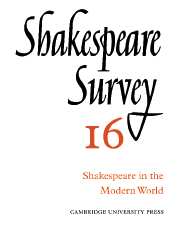Book contents
- Frontmatter
- An Obligation to Shakespeare and the Public
- Our Closeness to Shakespeare
- The Popularity of Shakespeare: An Examination of the Royal Shakespeare Theatre’s Repertory
- Shakespeare and the Fashion of These Times
- An Approach to Shakespearian Tragedy: The ‘Actor’ Image in Macbeth
- Shakespeare’s Impact Today in France
- Shakespeare and the Modern World
- Modern ‘Theatrical’ Translations of Shakespeare
- Shakespeare as ‘Corrupter of Words’
- Shakespeare in Ghana
- ‘Timon of Athens’
- Who Strutted and Bellowed?
- Shakespeare in Planché’s Extravaganzas
- ‘Our Will Shakespeare’ and Lope de Vega: An Unrecorded Contemporary Document
- Shakespeare and the Mask
- International Notes
- Shakespeare Productions in the United Kingdom: 1961
- Acting Shakespeare Today. A review of performances at the Royal Shakespeare Theatre, August 1962
- Canada’s Achievement
- 1 Critical Studies
- 2 Shakespeare’s Life, Times and Stage
- 3 Textual Studies
- Books Received
- Index
- Plate section
Our Closeness to Shakespeare
Published online by Cambridge University Press: 28 March 2007
- Frontmatter
- An Obligation to Shakespeare and the Public
- Our Closeness to Shakespeare
- The Popularity of Shakespeare: An Examination of the Royal Shakespeare Theatre’s Repertory
- Shakespeare and the Fashion of These Times
- An Approach to Shakespearian Tragedy: The ‘Actor’ Image in Macbeth
- Shakespeare’s Impact Today in France
- Shakespeare and the Modern World
- Modern ‘Theatrical’ Translations of Shakespeare
- Shakespeare as ‘Corrupter of Words’
- Shakespeare in Ghana
- ‘Timon of Athens’
- Who Strutted and Bellowed?
- Shakespeare in Planché’s Extravaganzas
- ‘Our Will Shakespeare’ and Lope de Vega: An Unrecorded Contemporary Document
- Shakespeare and the Mask
- International Notes
- Shakespeare Productions in the United Kingdom: 1961
- Acting Shakespeare Today. A review of performances at the Royal Shakespeare Theatre, August 1962
- Canada’s Achievement
- 1 Critical Studies
- 2 Shakespeare’s Life, Times and Stage
- 3 Textual Studies
- Books Received
- Index
- Plate section
Summary
‘We all sprang out of Gogol’s IIIuherb [The Overcoat]’, said Dostoevsky, referring to his contemporaries, the Russian realist-authors. This is true; but it is equally true to say that the whole of European and American literature in the nineteenth and twentieth centuries may be regarded as having sprung out of the heritage bequeathed by Shakespeare. There is a genetic relationship between modern art and the great discoveries which were made by him in the world of poetry and theatre.
It is he who first and foremost stands as the source of that new perception and portrayal of reality which, ever changing and enriching itself, has since developed in an inexhaustible wealth in different national forms and under different names. In fact, the seventeenth century was incapable of comprehending Shakespeare's greatness fully, for, out of the specifically English conditions of his age, he wrought something which went far beyond the borders of his epoch.
It is significant that Goethe and Schiller, Hugo and Keats, Balzac and Scott, Pushkin and the Russian realists of the nineteenth century all turned to Shakespeare for guidance. Even more significant is it that in the literature of the nineteenth century the Shakespearian principle in art was acclaimed by such different writers as Rolland and Hauptmann, Shaw and Gorky. Even Tolstoy's attacks upon Shakespeare sprang from the singular urgency of Shakespeare's art for Tolstoy.
- Type
- Chapter
- Information
- Shakespeare Survey , pp. 10 - 17Publisher: Cambridge University PressPrint publication year: 1963



